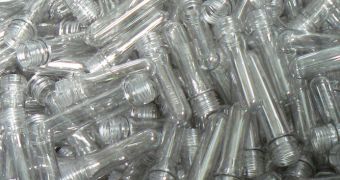One of the most important sources of plastic pollution are soft drinks and water bottles. Fleece blankets and other similar items are also a source of the petroleum-based compound, but a group of scientists announces that it may have just discovered a way of reducing the negative effects plastics have on the environment. They say that an organic compound could one day replace one of the materials most commonly used in PET (polyethylene-terephthalate) production.
According to AlphaGalileo, the plastic industry is worth several billions of dollars per year. This means that massive amounts of the stuff are being produced, and that pollution of this nature is at an all-time high. By replacing the dangerous and harmful chemicals in PET products, the industry could become “greener” and more eco-friendly, thus increasing its profits. The US Department of Energy (DOE) has already recognized the potential of the new bio-based product, classifying it as one of the most promising biological materials to be adopted by the chemical industry.
Plastic pollution is a very serious problem because the stuff takes hundreds of years to degrade in nature. In the mean time, it can break apart in smaller particles, and then contaminate the food chain, with negative health implications for plants, animals and humans alike. The situation is particularly catastrophic for fish, who choke on minute plastic particles floating around in the water, and die. Additionally, both the Atlantic and Pacific oceans are displaying structures known as garbage patches, which are essentially areas on their surfaces where currents agglomerated large amounts of plastic debris. This phenomenon is made easier by the fact that the material floats.
The work was carried out by a group of Dutch universities, industry and research institutes, known collectively as the Bio-based Sustainable Industrial Chemistry (B-BASIC) Consortium. The primary goal of this initiative is the development of sustainable methods for producing energy and everyday chemicals that would otherwise require polluting substances to manufacture. The leader of the research was Frank Koopman, an expert with the Dutch Organisation for Scientific Research (NWO), AlphaGalileo reports.

 14 DAY TRIAL //
14 DAY TRIAL //